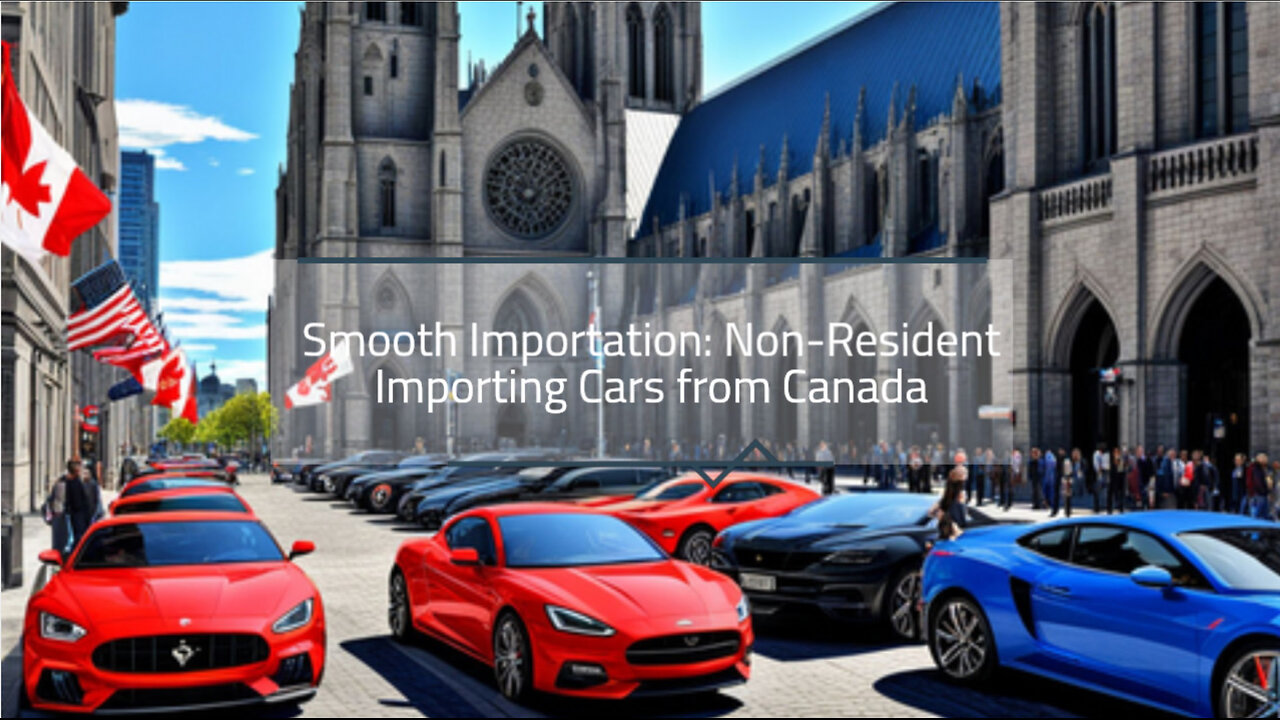Premium Only Content

Unlock the Secrets: Importing Cars from Canada - Non-Resident Edition!
ISF Solution | (832-904-9333)
clearance@isfsolution.com | www.isfsolution.com
In today's episode, we discussed the import regulations for non-resident importing cars from Canada. We started by explaining the concept of customs brokerage and the role of customs brokers in facilitating international trade. Moving on to the specific import regulations, we outlined the steps involved in importing a vehicle from Canada.
To begin with, it is necessary to obtain a customs bond, which serves as insurance guaranteeing payment of any potential duties, taxes, and penalties to the government. Next, an Importer Security Filing (ISF) must be submitted to US Customs and Border Protection (CBP) at least 72 hours prior to the vehicle's arrival. This filing provides important information about the shipper, consignee, manufacturer, and other details about the imported vehicle.
Preparing the required documentation is the next step in the importation process. This includes a bill of sale, certificate of title, recall clearance letter, emission compliance certificate, and a copy of the vehicle's registration. These documents serve as proof of ownership and ensure compliance with relevant regulations.
Working with a licensed customs broker is crucial at this stage, as they will handle the filing of all necessary paperwork on behalf of the importer. This includes completing forms such as the CBP Form 3461 (entry summary) and the EPA Form 3520-1 (importation of motor vehicles and motor vehicle engines) accurately and within the required timeframe.
Upon the vehicle's arrival at the port of entry, a customs inspection will take place. Customs officers will verify the documentation, conduct a physical examination if necessary, and assess any applicable duties and taxes. It is important to note that depending on the vehicle type and its compliance with US regulations, additional inspections or modifications may be required.
Once all necessary inspections are completed and any outstanding duties and taxes are paid, the vehicle will be released by customs, marking the successful importation. Working with a knowledgeable customs broker throughout this process can greatly simplify it and ensure a smooth and hassle-free experience.
In conclusion, importing cars from Canada as a non-resident entails following specific import regulations. It involves obtaining a customs bond, submitting an ISF, preparing the required documentation, working with a customs broker to file paperwork, undergoing customs inspection, and completing any necessary inspections or modifications. By working with a customs broker, the importation process can be made more efficient and successful.
#customsbrokerage #importregulations #nonresidentsimportingcars #internationaltrade #customsbonds #importdocumentation #customsclearance #licensedcustomsbroker #importprocess #carimportation
Video Disclaimer Here: For educational purposes - No affiliation with US government sectors.
-
![🔴LIVE-MARVEL RIVALS [1ST LOOK]❗ #MGGA #RUMBLEGAMING #RUMBLETAKEOVER](https://1a-1791.com/video/s8/1/f/N/y/K/fNyKv.0kob-small-LIVE-MARVEL-RIVALS-1ST-LOOK.jpg) LIVE
LIVE
Fragniac
10 hours ago🔴LIVE-MARVEL RIVALS [1ST LOOK]❗ #MGGA #RUMBLEGAMING #RUMBLETAKEOVER
330 watching -

RG_GerkClan
2 hours agoLIVE Sunday Special: Lets Dominate the Galaxy - Lego Star Wars The Skywalker Sage - Gerk Clan
768 -
 13:28
13:28
Found And Explained
10 days agoIs China's new fighter jet invisible ? - J-35
8 -
 6:00:02
6:00:02
SpartakusLIVE
15 hours agoMore RANKED || High-intensity SWEAT and ULTRA-PREMIUM content
146K12 -
 5:38:03
5:38:03
BrancoFXDC
12 hours ago $26.83 earnedWarzone Resurgence Rounds!
87.3K1 -
 48:02
48:02
Man in America
18 hours agoWill Trump FINALLY Prosecute the 2020 Election Criminals? w/ FEC Commissioner Trey Trainor
110K116 -
 12:51
12:51
Tundra Tactical
16 hours ago $36.35 earnedNYC Killer: Guilty or Patsy?
115K19 -
 26:09
26:09
MYLUNCHBREAK CHANNEL PAGE
1 day agoThe Hidden Tunnels of Osiris
152K72 -
 2:42:35
2:42:35
Jewels Jones Live ®
1 day agoLAWFUL DRONES | A Political Rendezvous - Ep. 102
222K56 -
 4:22:48
4:22:48
Pepkilla
21 hours agoWarzone Ranked Road to 250 ~ HaLLLLPPPPP
144K6